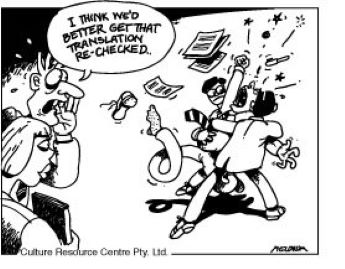Culture@Work
Welcome! My name is Joost Thissen and I am an Interculturalist. Here I share intercultural insights for those of us who work in culturally diverse and global workplaces.


Welcome! My name is Joost Thissen and I am an Interculturalist. Here I share intercultural insights for those of us who work in culturally diverse and global workplaces.


cultural column  Email This Post
Email This Post
Translating documents and materials across cultures can cause a few headaches. Lost in translation can happen in a variety of situations: I like to share some scenarios that we came across over the years in our Intercultural Learning and Development Practice.
During the facilitation of a training session, a lawyer came to us and shared the following translation experience. After the lawyer had put a lot of time into preparing a contract with a future Chinese joint-venture partner, he forwarded the contract to a translation bureau. When the final translated version came back he was a bit suspicious: the amount of pages was definitely far less than the one he had handed in. Furthermore, although he could not read what had been translated, he sensed that a number of clauses were missing. When he set up a meeting with the translator the person looked at him and smiled: and indeed they had left quite a lot of the original text out. The translator then argued: “Those clauses would not have made sense to the Chinese Partners of the joint venture anyway… and your ultimate goal is to get the joint venture up and running, isn’t it?”
Years ago, I worked for a client based in Singapore and I was involved in a number of staff survey translations for the Asian region. The first time after I used an official translating office for an Indonesian survey, I asked one of the Indonesian staff in the Singapore Client office to review the officially translated survey. Fortunately we discovered a few mistake before the survey went to print: some words in Bahasa Indonesian were no longer in use, and new words had actually entered the language in recent years. You almost had to live in the country to keep track of the changes. So what had happened? It appeared that my official translator had moved from Jakarta to Singapore 10 years before, and that she was also new to the jargon of organisational surveys. We designed a question in the survey about rating the organisational climate in the client organisation. This was a key concept for our client: they were trying to establish employee’s perceptions about the corporate culture in each of the subsidiaries of the international organisation across the globe. This specific translation was done for staff in a recently acquired subsidiary in Java. Apparently my Indonesian translator was not very familiar with the concept of ‘Organisational Climate’ and translated it as “Environmental issues”. A translation that the Indonesian staff in the Singapore office found very funny…
Another scenario comes from a consultant practice which was asked to review issues during the software implementation of a logistical package in Mainland China. The project had caused some serious problems; it went over time, over budget and the software was still not working properly. Interestingly enough, some of the problems were related to both culture and language. To be able to translate the software into Simplified Chinese the translators discovered that for some concepts there was simply no suitable word available in the Simplified Chinese language: a word like “compliance” was not common jargon or practice. To be able to translate a concept in another language, the culture and the language need to be able to support and understand the concepts. In this case the Chinese organisation had to be first educated in Western practices such as compliance in order to understand key concepts in the software…
What to watch out for when you need translations of business documents? Although you may argue that a good translation need to be ‘correct’, there is much more to translating than only being correct. Translations need to make sense across cultures. Translations need to take into account the cultural context to ensure that meaning and intention is clear and accurate. In the legal contract scenario, the cultural context of the Chinese translator may be that too many clauses hamper trust and relationships, and could jeopardize the required business outcome. In the staff survey translations and in the Chinese software project scenarios there was the challenge of introducing unfamiliar or new concepts before the translation would become relevant and meaningful. You cannot translate a concept successfully if it does not exist in the language.
To avoid ‘getting lost in translation” make sure that you make time and budget available to have documents translated ‘forward’ and ‘backward’. The forward translation (from your language into the foreign language) needs to be done by someone who is a native speaker of the foreign language, has current knowledge of the industry, and understands the jargon. The back translation needs to be done (by a different and preferably) bi-lingual translator to make sure that certain concepts do not get ‘lost’. Obviously all translators need to work independently.
We need to identify the skills and competencies that make the difference between a translator and a culturally competent translator. The translation competence is much more than to acquire simple cultural awareness: it is also the translator’s ability to culturally interpret and adjust a text for use in a different culture, keeping in mind the intended outcome. In the legal contract scenario the Chinese translator might actually have been right in the assumption that too many clauses might hamper the final outcome of the intended joint venture. In that specific scenario, the fact that clauses were “lost in translation” may not have been such a bad thing after all…
_________________________________________
Joost Thissen, Partner & Interculturalist
joost@cultureresourcecentre.com.au
cultural column  Email This Post
Email This Post
Title inspired by “Lost in translation” https://www.youtube.com/watch?v=W6iVPCRflQM